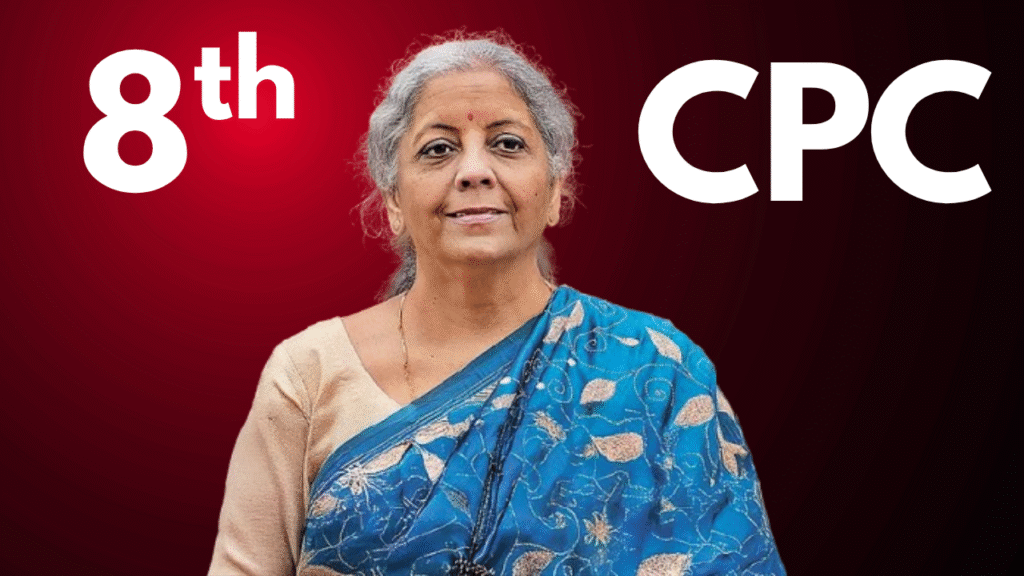The 8th Pay Commission latest news 2025 has left over 1.2 crore central government employees and pensioners in a state of anticipation and uncertainty. Approved by the government on January 16, 2025, the 8th Pay Commission was expected to bring a much-needed salary and pension revision starting January 2026. However, recent updates indicate significant delays, with implementation potentially pushed to 2027 or even 2028. With the 7th Pay Commission’s tenure ending on December 31, 2025, employees are eager for clarity on the central government salary hike 2025. In this article, we’ll dive into the latest developments, expected changes, reasons for delays, and what this means for government workers and retirees. Let’s explore what’s happening with the 8th Pay Commission and what you can expect next!

What Is the 8th Pay Commission and Why Does It Matter?
The 8th Pay Commission is the latest in a series of commissions set up by the Government of India to revise salaries, allowances, and pensions for central government employees and pensioners. Since the first commission in 1947, these bodies have been formed roughly every 10 years to adjust pay structures in line with inflation, cost of living, and economic conditions. The 7th Pay Commission, implemented on January 1, 2016, brought a 23.55% increase in pay and allowances, raising the minimum basic salary from ₹7,000 to ₹18,000 with a fitment factor of 2.57.
For over 1.2 crore employees and pensioners, the 8th Pay Commission is a critical event. It promises to address rising living costs, especially after the 7th Pay Commission’s decade-long run ends in 2025. Employees expect a substantial central government salary hike 2025, while pensioners hope for better financial security. However, the slow progress in forming the commission has raised concerns, leaving many wondering when—or if—these revisions will materialize as planned.
Latest Updates: Delays in Formation and Implementation
The most significant update on the 8th Pay Commission delays 2025 is the lack of progress in its formal constitution. While the Union Cabinet, led by Prime Minister Narendra Modi, approved the formation of the 8th Pay Commission on January 16, 2025, no formal Gazette notification has been released as of mid-June 2025. Key elements like the Terms of Reference (ToR), which outline the commission’s scope, and the appointment of a chairperson and members remain pending. Reports indicate that the Department of Personnel and Training (DoPT) has extended the application deadline for four Under Secretary posts to June 30, 2025, signaling slow bureaucratic movement.
Historically, pay commissions take 18–24 months to submit their reports, followed by additional time for cabinet approval and rollout. The 7th Pay Commission, announced in February 2014, took nearly two years to implement by January 2016. Given the current delays, experts predict the 8th Pay Commission’s recommendations may not be implemented until late 2026, early 2027, or even 2028. This has sparked frustration among employees and pensioners, with organizations like Bharat Pensioners Samaj (BPS) writing to the Ministry of Finance and DoPT, urging immediate action to expedite the process.
Expected Salary Hike and Fitment Factor
One of the most anticipated aspects of the 8th Pay Commission is the potential salary hike, determined by the fitment factor—a multiplier used to calculate revised basic pay. The 7th Pay Commission used a fitment factor of 2.57, increasing the minimum basic salary from ₹7,000 to ₹18,000. For the 8th Pay Commission, experts estimate a fitment factor between 1.92 and 2.86, though a more realistic range of 2.5 to 2.7 is often cited to balance employee expectations and government finances.
- Fitment Factor of 2.5: This would raise the minimum basic salary from ₹18,000 to ₹45,000.
- Fitment Factor of 2.86: A more optimistic scenario could push the minimum basic salary to ₹51,480, as speculated by some sources.
Additionally, there’s talk of merging the Dearness Allowance (DA) into the basic salary. As of January 2025, DA stands at 55%, with one more hike due in July 2025. Merging DA could streamline pay structures, but it depends on the commission’s final recommendations. For Level 2 employees (e.g., clerks, junior staff), a fitment factor of 1.92 could raise gross salaries to around ₹70,506 per month, a 40% increase, though these projections remain speculative until the ToR is finalized.
Impact on Pensions: What Pensioners Can Expect
Pensioners are equally eager for updates, as the 8th Pay Commission will revise pension structures alongside salaries. Currently, over 67 lakh central government pensioners receive pensions based on the 7th Pay Commission, with a minimum of ₹9,000 per month. If a fitment factor of 2.86 is applied, the minimum pension could rise to ₹25,740, though a more conservative estimate with a 2.5 factor would bring it to around ₹22,500.
Some sources, including posts on X, have claimed a “massive 150% pension hike,” but these lack credible backing and should be viewed skeptically. More realistically, pension revisions will mirror salary hikes, with automatic adjustments once the commission’s recommendations are approved. However, the delay in implementation means pensioners may not see these changes until 2027 or later, causing concern for retirees nearing the end of their financial planning years.
Why the Delay in Implementing 8th CPC?
The 8th Pay Commission delays 2025 stem from several challenges:
- Lack of Formal Constitution: Despite cabinet approval in January 2025, the absence of a formal structure, chairperson, and members has stalled progress. The DoPT’s slow recruitment for staff positions (e.g., Under Secretary posts) reflects bureaucratic inertia.
- Terms of Reference (ToR) Not Finalized: The ToR, which defines the commission’s scope, is still under discussion. Without it, the commission cannot begin its work.
- Historical Timelines: Pay commissions typically take 2–2.5 years to submit reports, followed by 6–8 months for implementation. With no commission formed by mid-2025, the January 2026 timeline is nearly impossible.
- Political and Fiscal Priorities: Some speculate that the government may be prioritizing post-election fiscal planning (e.g., upcoming Bihar elections in late 2025) over the commission’s formation, though this remains unconfirmed.
These delays have fueled uncertainty, with employees and pensioners worried about financial planning amidst rising inflation. The lack of transparency from the government has only added to the frustration, as many expected quicker action following the January approval.
What Employees and Pensioners Are Saying
The sentiment among central government employees and pensioners is a mix of hope and frustration. A survey cited in Bengali news outlet Kolkata24x7 revealed that 83% of government employees want the 8th Pay Commission implemented by the end of 2025, reflecting widespread eagerness for a salary boost. On X, posts echo this anticipation, with some users speculating about fitment factors and implementation dates, though others express dismay at the delays. For instance, the Financial Express noted that pensioners’ associations are demanding urgent action to avoid further uncertainty.
Employees nearing retirement are particularly concerned, as a delayed implementation could mean missing out on revised pensions during their most financially vulnerable years. Meanwhile, younger employees worry about the impact of inflation on their current salaries, especially with the 7th Pay Commission’s structure nearing its end. The lack of official updates has led to a proliferation of unverified claims, with some sources exaggerating potential hikes, further muddying the waters.
FAQs About the 8th Pay Commission
While initially expected by January 2026, delays suggest implementation may not occur until late 2026, 2027, or even 2028.
Estimates range from 1.92 to 2.86, with 2.5 to 2.7 being more realistic, potentially raising the minimum basic salary to ₹45,000–₹51,480.
Pensions are expected to rise in line with salary hikes, with a minimum pension potentially increasing to ₹22,500–₹25,740, depending on the fitment factor.
The commission has not been formally constituted, the ToR is not finalized, and bureaucratic delays in appointments have slowed progress.


